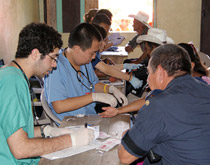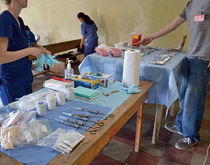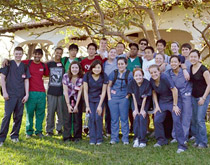The flow of people is constant—mothers with sleeping infants bound tightly to their chests. Small children within shouting distance of a parent or grandparent. Bands of brightly dressed teenage girls. Several generations of fathers and sons. Some are traveling by horseback, others by bicycle. But most are on foot, climbing for miles in sandals along narrow dirt roads through the remote mountains of central Honduras to reach the Iglesia Evangelica Bautista Emanuel.

The early March air is calm and tropical; the corn and sugarcane fields seemingly beckon for their workers. But today they are left unattended. Everyone is traveling to the village of Pajarillos, lining up by the hundreds outside the adobe church in the heart of the community. Many left before daybreak and will stand for several hours in the queue that snakes around the building.
Among them is a boy, no older than seven, waiting quietly with his mom, who is little more than a child herself. Thin and malnourished, but not skin-and-bones, the boy has an open cut on his scalp oozing with pus and another deep gash on his left big toe, which is black with infection. He also has a strange pattern of oval-shaped spots on his face that would worry any mother.
Most residents of Pajarillos live in extreme poverty, as does more than half the population of rural Honduras—the second-poorest nation in the Western Hemisphere, after Haiti. Although the government has achieved some economic stability since 2000, progress has not meant a better life for the country’s huge proportion of poor people. They lack access to land, jobs, education, and basic services, with high rates of infant mortality, child malnutrition, and illiteracy. The closest medical center to Pajarillos is two hours’ walking distance. Children through sixth grade attend school in the same one-room building—if they don’t have to drop out to work in the fields or sell goods alongside the road. The average monthly family income is about 2,000 Honduran lempiras, which translates to $21 per person—that’s less than $1 a day.
The first time Wendy Li (S’13) came to Honduras on a volunteer mission three years ago, it was all very hard to absorb. She doesn’t speak much Spanish and had never traveled to Latin America before. It was a world away from her comfortable life growing up in Pittsburgh’s suburbs and at Carnegie Mellon, where she is on a pre-med track majoring in biological sciences.
But she knows now, on this day, she can’t be paralyzed by sadness or pity. She and the other volunteers have a job to do, and hundreds of people are lined up, waiting patiently for help. Li has traveled here for a week during spring break with 18 other Carnegie Mellon students representing the university’s chapter of Global Medical Brigades; it’s part of an umbrella organization called Global Brigades, which also runs business, law, architecture, dental, environment, microfinance, public health, and water programs.
In Global Medical Brigades, student volunteers and health professionals establish free mobile medical clinics in impoverished communities in Honduras, Panama, and Ghana. The volunteers—called “brigaders”—get hands-on, immersive experience in the field of international medicine. They help with triage and intake by measuring vital signs, asking patients about their symptoms and medical histories, and recording the data. The students shadow doctors, nurses, and dentists as they consult with and treat patients. They assist in a pharmacy under the direction of a licensed pharmacist. And they lead preventive healthcare workshops to educate residents on a variety of issues, some as basic as proper tooth-brushing.
For partner communities like Pajarillos, this is not just a one-off deal. Each community welcomes a Global Medical Brigades chapter from a different university every three to four months to sustain a consistent level of health care. In 2011 alone, the organization sent 2,480 volunteers on 91 brigades to Honduras and Panama, serving nearly 63,000 patients.
“Our model is very holistic and sustainable,” says Jennifer Grasso, community health workers coordinator for Global Medical Brigades in Honduras. Although the challenges they face in communities like Pajarillos can feel overwhelming at times, Grasso and her colleagues remind the students about the power of their collective impact. “We also try to emphasize the change in the world they are making by affecting the life of one person at a time,” she says.

That’s what Wendy Li focuses on inside the hot, crowded church in Pajarillos as she stands next to an American doctor at a wooden pew that serves as a patient exam table. Over the next three days, Li and her fellow brigaders will see almost 600 patients here. It’s loud and sticky in the church and more than slightly chaotic. From inside, Li can hear donkeys braying and the Spanish cry of vendors hawking plantain chips. Skeletal dogs slink underfoot as parents fan themselves while trying to soothe their frightened children.
The youngster with the two deep cuts approaches the consultation station where Li is working. The cut on the boy’s head is covered in a thick wad of pus like a piece of gum stuck in his hair. The bacterial infection on his blackened toe has eaten away at his skin, destroying the tissue. Back in Pittsburgh, these kinds of wounds would be easily fixed from the outset with a Band-Aid and some antibiotic ointment, maybe a few stitches. Here in Honduras, they can fester untreated until they become a matter of life and death.

Parasitic diseases also are common in Pajarillos, where many kids play outside barefoot, and—until the recent work of Global Brigades—lacked clean water and concrete floors in their homes. After examining the boy’s cuts, the doctor explains to Li that the spots on his face are signs of a fungal infection called ringworm. The child screams as the doctor begins to rinse his wounds with hydrogen peroxide, but he doesn’t pull away.
Eda Akyar (S’11) launched the Carnegie Mellon chapter of Global Medical Brigades in 2008. Akyar recently completed a 10-month stay in Indonesia teaching English as a Fulbright scholar and is now pursuing her master’s degree in public health at Yale University—then her plan is medical school.
Indeed, many brigaders are pre-med, but others study design, business, history, and art. “The only two real requirements are passion and dedication,” Li says. Interest in the program at Carnegie Mellon has skyrocketed in the past five years, with 60 applicants last fall competing for a dozen new spots with seven returning volunteers.
This trend reflects a growing interest on campus in global volunteerism, according to Amy L. Burkert, vice provost for education and former director of the health professions program. Student participation in short-term opportunities abroad has more than doubled at Carnegie Mellon since 2008, including service-learning trips. These trips are conducted during academic break periods, with volunteers traveling to locales exotic and otherwise to build latrines, plant trees, teach English, volunteer at orphanages, and much more through programs such as Habitat for Humanity and Students in Free Enterprise.
Burkert views it as a natural extension of Carnegie Mellon’s fundamental philosophy. She says: “We take a very pragmatic approach to using the knowledge and skills we have to make an impact on real-world problems, so that bridge is really solidly grounded in our curriculum and our research. It’s just part of our ethos.”
Li joined Carnegie Mellon’s chapter of Global Medical Brigades during her freshman year and is now the co-president along with Nicolas Zuniga (CMU’14). She has always loved science and came to college with the goal of pursuing a research career. But after her first trip to Honduras, she realized how much she enjoyed the one-on-one interactions in medicine and switched to a pre-med track.
It’s a common narrative. Li’s former co-president, Justine Record (MCS-DC’12) is spending this year as an AmeriCorps volunteer before applying to medical school and credits Global Medical Brigades as sending her down this career path. Zuniga arrived at Carnegie Mellon determined to become a psychologist, but his hands-on experience helping to treat conditions of mind and body through Global Medical Brigades refocused his sights on medical school.
“Most college students don’t have the opportunity to work directly with patients, even if they shadow doctors in the U.S.,” says Zuniga, a fluent Spanish speaker whose translation skills have been invaluable on brigades. “But it’s not just knowing what to do or even knowing Spanish. It’s learning how to communicate compassionately and put people at ease and just see people eye-to-eye.”
He recounts the story of a young man in Pajarillos entering the clinic complaining of an upset stomach but uncomfortable discussing his symptoms. Through conversation, Zuniga gained the man’s trust, convincing him to talk to the doctor about a fever and swelling that indicated he had a parasitic illness called Chagas disease, which is curable if caught early enough. “You learn quickly that we aren’t so incredibly different despite the differences between our cultures,” Zuniga says.

What impresses Burkert most about the Global Medical Brigades chapter at Carnegie Mellon is that it isn’t just a “one-and-done” experience. The students work throughout the year to recruit physician volunteers and to raise money for medications to bring with them to Honduras and to help subsidize their travel, which costs about $1,500 a person. This past year alone, the chapter collected $60,000 worth of medication, including antibiotics and anti-parasitic drugs, allergy and cold medicines, vitamins, and personal hygiene products. It was enough to fill 19 suitcases with 50 pounds of drugs and supplies apiece. Only some shampoo was left behind.
To reach this goal, the students solicited the support of major Pittsburgh corporations, foundations, and the university itself, and they even held bake sales on campus. They also stood outside local drugstores asking customers to purchase specific medications to donate for their trip and called upon students to use any leftover money from their dining plans to buy supplies. In doing so, they raised awareness about health and economic disparities both in Honduras and closer to home.
“This isn’t a limited boutique kind of experience where you parachute in for a week and say, ‘Oh, my life has been changed’ and then move out,” Burkert says. “The impact of the Brigade experiences on the students involved has been profound. It has even inspired them to translate their global experience into local action.”
Last academic year, the students offered free blood-pressure screenings at the Goodwill store in Pittsburgh’s South Side neighborhood through a program they have dubbed “Local Medical Brigades.” They hope to expand that program this year to provide glucose screenings and medical referrals in conjunction with Prevention Point Pittsburgh, a needle-exchange program for injection-drug users.
“We didn’t just want to be the spring-break trip that went away for one week and didn’t do anything throughout the year,” says Record, last year’s co-president.
It’s this commitment and dedication above and beyond the Global Medical Brigades program that sets apart the Carnegie Mellon chapter, according to Grasso, the group’s coordinator in Honduras. “I don’t know of other universities that do this like the Carnegie Mellon group,” she says. “It’s really a model for the rest of our chapters.”
Whether they are working with drug addicts on the streets of Pittsburgh or villagers in Honduras, Li believes that as long as you make the effort, a change is possible. And it’s well worth it, she says, even if you just reach a single individual, like the boy she helped that morning in the Pajarillos church.
After the doctor cleaned his infected cuts, Li escorted the boy and his mom to the makeshift pharmacy located in an adjacent building where they were given antifungal cream for the ringworm and antibiotic ointment for the cuts. Whether their intervention was early enough to save his toe, she’ll perhaps never know. But they probably saved his life—and left hers forever changed.
Jennifer Bails is an award-winning freelance writer. She is a regular contributor to this magazine.
Related Links:
Students Gain Medical Experience in Honduras
Serving People in Developing Communities



